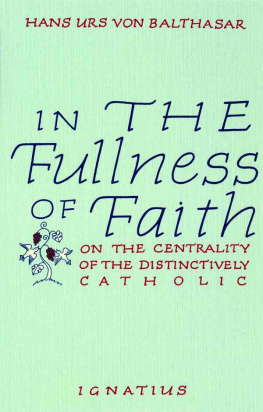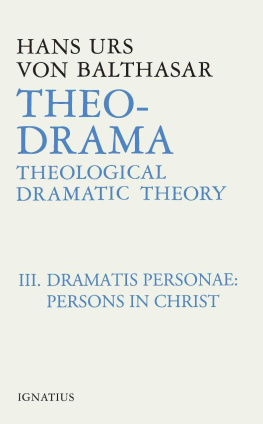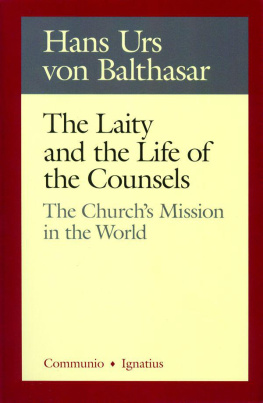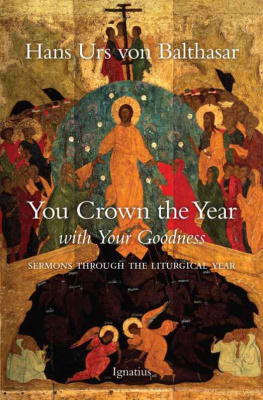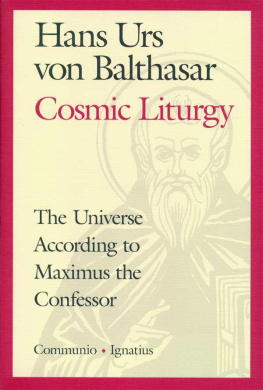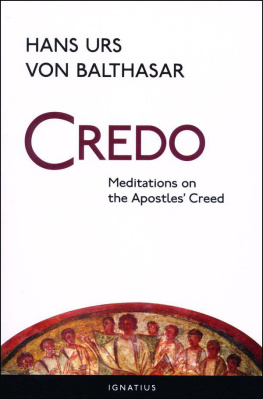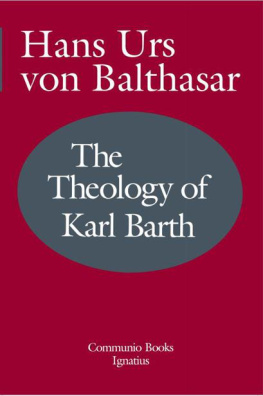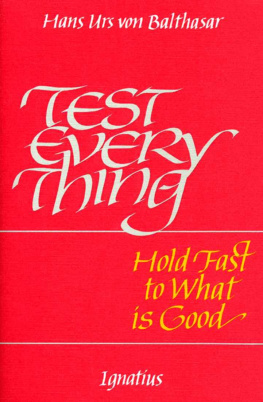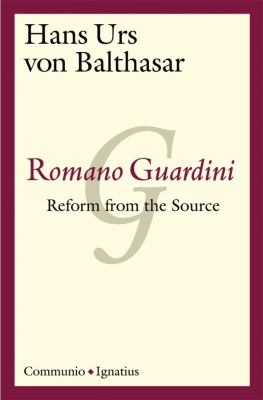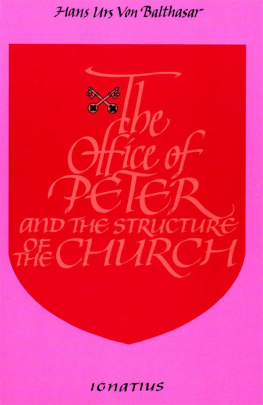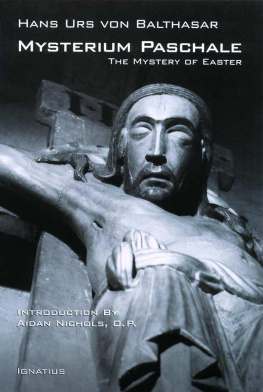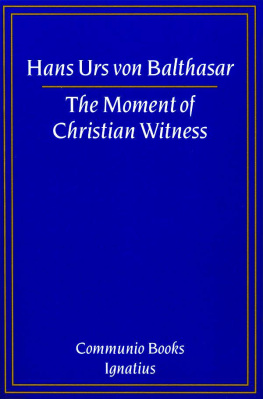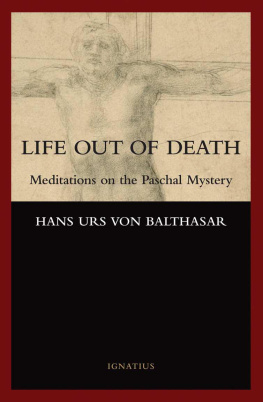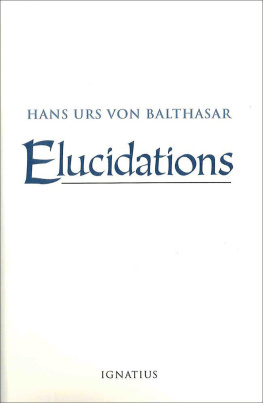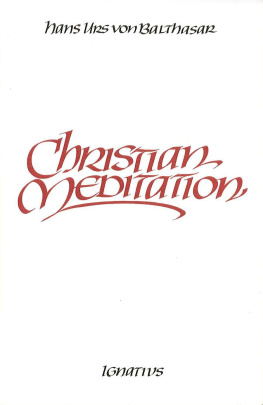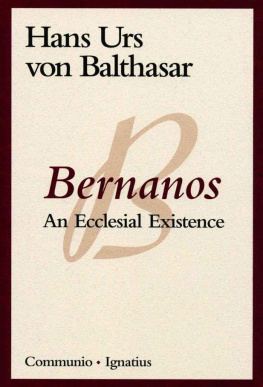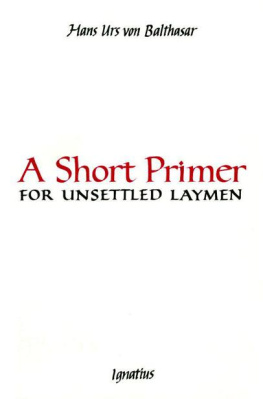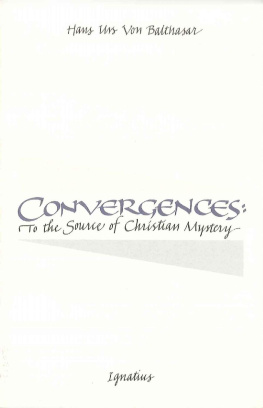In the Fullness of Faith
Hans Urs von Balthasar
In the Fullness
of Faith
On the Centrality of the
Distinctively Catholic
Translated by Graham Harrison
Ignatius Press San Francisco
Title of the German original:
Katholisch
1975 Johannes Verlag
Einsiedeln, Switzerland
Cover by Victoria Hoke Lane
With ecclesiastical approval
The granting of the Imprimatur docs not imply the
acceptance of the theological opinions of the author.
1988 Ignatius Press, San Francisco
All rights reserved
ISBN 978-0-89870-166-1
Library of Congress Catalogue Number 88-80727
Printed in the United States of America
Contents
Can People Still Understand the Word Catholic?
The Whole in the Part
A Testimony Unworthy of Belief
Kenosis?
The Transformation of Fear
The Loss of the Corporate Subject
Dedication
Jesus Is Catholic
The Spirit Proves... What Is Beyond Proof
Gods Love Is Catholic
Catholicity and Salvation History
The Cross as the Center of Catholic Reality
The Cross and the Clash of Wills
Imitating the Inimitable
Immediacy Mediated
WaveParticle
Bursting the Seams
Is Too Much Demanded of the Christian?
You are the Light of the World
I Am With You Always
The Arrow of Longing
Retrospect as Prospect
Travelling Light
On the Other Hand
Institution as Discipline
The Alternative
An Atmosphere
Luther
Communio in its Catholic Meaning
Rooted in Christ
Loneliness and the Communion of Saints
Faith and Fruitfulness
Living in Fruitfulness
The Catholicity of the Individual Christian
The Spirit and the Yes That Creates the Church
Sanctorum Communio in the Early Church
On Saints
The Veneration of Saints
Quiet Miracles
Mother Church
Scripture
Apostolicity
Authority as Form and Content
The Petrine Element
Dogma
Sacramental Authority and Infallibility
The History of Doctrine and the History of the Church
Destination World
Upwards and Downwards
Relics?
Pilgrimages?
IntercommunionInterconfession
Celibacy
Religious Vows
Written on the Water
A Definition
Mission and Futility
Mission in Crisis
The Scattering
Veiled Reality
The Limitations of Our Age
Ecumenical Trust
World Views
Church and World
The reader looking for a loose collection of aspects and perspectives, observations and data without any claim to system and completeness, can find them in the pages of Josef Neuners Die Weltkirche. Die Katholizitat der Kirche im Missionswerk (in Holbock-Sartory, Mysterium der Kirche, 1962) or in M.-J. Le Guillou, Mission et Unit, 2 vols. (1960), or in Wolfgang Beinert, Um das dritte Kirchenattribut. Die Katholizitat der Kirche, 2 vols. (1964). Or he can turn to a work of genius that marked a breakthrough to new Catholic thought, namely, Henri de Lubacs Catholicism (1936 ).
Here we are concerned with only those aspects that characterize the mystery of the (Roman) Catholic Church vis-a-vis the other Christian denominations, i.e., things which, in ecumenical dialogue, Catholics are often more reluctant to mention and which they try to play down. There are two ways of doing the reverse, of showing that such things are often central. There is the counter-Reformation way of polemics, meeting assertions with counter-assertions; and there is the genuinely Catholic way, which starts out from the mystery affirmed by both parties and endeavors on this basis to show the distinctively Catholic teaching, so that, from his own standpoint, the non-Catholic partner-in-dialogue is able to see the inner connections. This is neither controversy, therefore, nor diplomatic irenicism, nor some neutral comparative study of denominations, but a reflection that can call itself ecumenical because it is Catholic .
Foreword
This small book was written as an expression of friendship. The author reached his 70th birthday in 1975. Such anniversaries..... in Germanic countriesnever pass unnoticed. The more so in this case since Fr. von Balthasar has made so many grateful friendsand not only because of his booksamong all Christian groups and beyond. He wanted to respond to all, beyond the more personal expressions of gratitude. And that is the origin of this book whose original title was the single word: Catholic .
Catholic : that title perfectly expresses the content, which is simply the explanation of that word. Not a lyrical exaltation, not even, really, a profession of faith. Nor, in the strict sense, a treatise of apologetics or theology. There is no systematic order to it. No hidden polemical agenda, no attempt to be contemporarythough there are reflections scattered throughout which, without direct allusion, flash a brilliant light on the present situation and provide a standard to evaluate ecumenical dialogue. Very simply, the explanation of a word, in measured tones, as from one friend to another who is perhaps startled and wants to understand.
The original circle of friends first intended extends to unknown readers. Look, says the author to each of us, without provocation but without fear. Look at what being a Catholic means to me. But it is not my own imagination that I have consultedbut rather what the Church, spouse of Christ and guardian of the Scriptures, has taught me of herself, by her life as by her word, by her origins, her past, her present. The explanation is directed first of all at Protestants, and more especially, in several passages, Lutherans. But it is also addressed to us all. In fact, it ought to be beneficial above all to Catholics themselves. For we are always in need to learn, to understand better in order to become more fully what we are.
In what pertains to the spirit of this explanation, the original and spontaneous method it follows, these are amply described in the first pages and need no definition here. I will only caution the reader: do not expect a personal testimony or subjective self-revelation. It is not an individual who is speaking. It is a believer, a son of the Church who, with his own personal accent, tells us of the faith to which he has committed himself, and which is the same for all.
Henri de Lubac
Introduction:
The Present Situation
Can People Still Understand the Word Catholic ?
Catholic is a quality. It means totality and universality, and the understanding of it presupposes a particular human attitude of mind and heart. It is true that the catholicity of the Catholic Church is primarily a revelation and communication of the divine totality, it is true that the acceptance of this revelation by men is primarily the work of grace; all the same, it is possible for a historical period to be stretched beyond its limit by this grace. This seems to be the case in the period in which we live.
For us, efficiency resides in the part, in the party; the alternative is a tolerant and inefficient cosmopolitanism. Quality seems to go with the part, the partial; totality seems to be synonymous with a lack of contour. We need to ask ourselves whether a great deal of our ecumenism is not bought by sacrificing quality. (In the ancient world, the oikumene was the geographical span of the inhabited world, the cosmopolis.) Does it not bear some resemblance to the religious syncretism of pre-Christian Rome?
The Catholica is labelled Roman Catholic, as one clan among others, and it is a source of irritation that the Church refuses to join the World Council of Churches on an equal footing. For the WCC is the kind of totality that is intelligible to people nowadays. Furthermore, the attribute Catholic has become subject to so many nuances that every denomination upholding the ancient Creed lays claim to it and interprets it as it thinks best.
Next page
